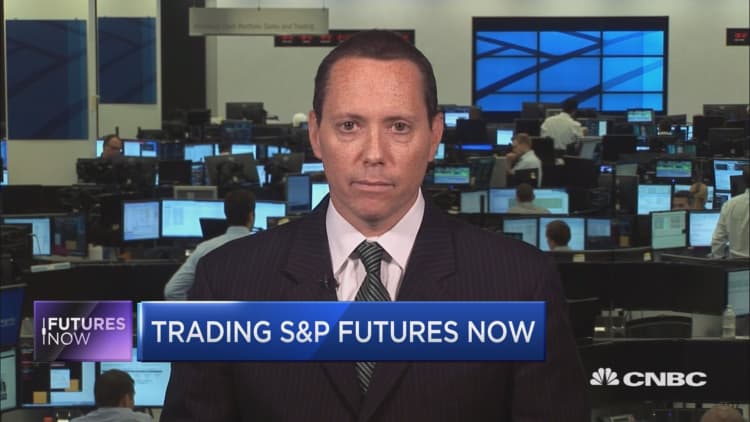
The second-longest bull market in history has driven stock valuations sky high.
High valuations present a challenge for investors concerned about risk: Should they stick to their plan, change their investment strategy or sit on the sidelines in cash? A Goldman Sachs analysis, for example, found that the median stock trades in the 99th percentile of its historical valuation. (See chart below.)
"By conventional measures, the median stock still appears to be dramatically overvalued compared to historical averages," said Corey Hoffstein, chief investment officer at Newfound Research in Boston, which has $400 million in assets under management.
Stick to your plan
"Almost daily we're hearing from clients that they're uneasy with the stock market and they don't want to go into bonds given the low yields," said Jeff Nauta, a certified financial planner in Belmont, Michigan. "There is no evidence that a stock market hitting a new high will lead to lower or higher expected returns over the next 1 to 3 to 5 years."
Nauta advises his clients keep their portfolios diversified in stocks and bonds as well as alternatives, such as bank loans and real estate.
Reassess your risk appetite
If you're about worried about high stock valuations, it may be time to reassess your risk tolerance.
Howard Pressman, a certified financial planner in Vienna, Virginia, has shifted from stocks of small and mid-sized U.S. companies, developed international stocks, emerging market stocks and high-yield bonds in the most conservative portfolios he manages to higher-quality stocks and bonds and added a smaller allocation of Treasury Inflation-Protected Securities.
However, Pressman left the portfolios for his most aggressive clients untouched.
"These clients are farther from their goals and can better withstand the ups and downs of the market," Pressman said. "Our opinion is that there is still room for growth in this market."
Any adjustments outside of tax-advantaged accounts, such as IRAs and 401(k) plans, may mean you will have to pay capital gains taxes on your portfolio tweaks.
Valuation isn't everything
High valuations are not necessarily a sign of a market downturn, said Peter Mallouk, president and chief investment officer at Creative Planning in Leawood, Kansas, which has more than $18 billion in assets under management.
"While U.S. stocks are slightly above historical averages, we see tremendous bargains overseas," Mallouk said. He recommends that investors have a portfolio that is diversified globally to take advantage of value wherever it may be.
Interest rates were much higher during the dot-com bubble, and given the low-rate environment, stock valuation may not be the best reference point to determine if the stock market is overvalued, Newfound Research's Hoffstein said.
"Determining fair value is a tricky proposition, as structurally higher valuations can be justified by lower discount rates or increased expectations in earnings growth rates," Hoffstein said. "One signal we might look for is an earnings-yield level significantly below the 10-year U.S. Treasury rate, indicating that investors are forgoing the guaranteed Treasury return for a lower, and speculative, equity return."
Nevertheless, most advisors agree that cash would be the worst place for long-term investors to park their money in response to high stock valuations.
"Maintaining large amounts of cash on the sidelines for a significant period of time can lead to a dramatic loss in real purchasing power," Hoffstein said.


